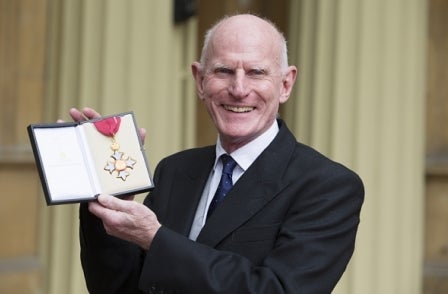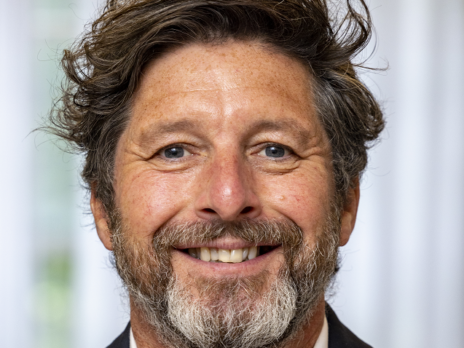
Telegraph art critic Richard Dorment said he leaves the paper with "great gratitude" after 29 years of "writing about things that I liked, more than I didn't like".
Dorment (pictured above with the CBE he was awarded last year) uses the word "art-rage" to describe the prevailing attitude towards contempary art when he arrived at the Telegraph in 1986. But over the next decade he adopted a more open-minded approach to modern art than was seen in much of the media.
He says: "The tone of Telegraph has gone up, it has gone down, it has been a bit more conservative, then a bit more liberal. It has now got to embrace online content. And this is a good thing: it means that it is changing. I leave the paper with no regrets, but with great gratitude."
Originally from the United States, Dorment studied art history at Princeton and Columbia, before working as a curator. After moving to Britain, he took up the post of chief art critic for the Telegraph, whilst continuing to curate and catalogue.
He says: "I made a decision early on that I'd rather write about things that I liked, more than I didn't like". This was a decision that, he says, put his work in the firing in the late 1980s and early 1990s.
He quotes a newspaper leader column from 1995 attacking the decision to award Damian Hirst the Turner Prize which described it as "an odious and disgusting scandal". It also dismissed the "narcissistic elite" responsible for awarding the prize. "That refers to me," Dorment says. He also praises Richard Cork from The Times for taking a similarly progressive view about art.
Dorment recalls that he was encouraged by Telegraph management to continue in the same vein.
He says: "In the early 1990s, readership went into steep decline. Investigation revealed that this was nothing to do with disloyalty. It seemed that instead of switching newspapers, loyal readers were actually dying of old age."
He recalls that one day, outside consultants went through that morning's paper with the managerial team, suggesting ways of attracting younger readers. When they came to the arts pages, they singled out Dorment's review of a Gerhard Richter exhibition at The Tate as exemplary. "At that point I didn't feel safe with my reviews," he confesses. However, shortly after the consultants came in, Dorment received a call from section editor Nigel Reynolds. "Nigel was Blunt: from now on, I had a free hand to write what I wanted. The consultants had said that my piece was what the entire paper should be aiming for".
Despite being an early defender of the Turner prize, Dorment believes the annual award has had its day. "Oh I think it should be stopped… It has long outlived its usefulness and it doesn't produce art that's interesting anymore."
Asked whether he feels that, as a critic, he has a duty to educate the public about good and bad art, he says: "Well it bothers me when bad art is being given merit simply because it's on display. But the act of criticism itself is defining something – defining what you think is interesting or important enough to write about. Selection is the most important decision you make as a critic."
Asked what makes a good art critic, he says: "Firstly, know what you're talking about", before adding that "plenty of good critics come into the business without an academic background, as artists themselves who have a love for it and an understanding of its values".
He also says that a good critic needs to have a "relative appreciation of art's value". He says: "Had I not been aware of what was happening in contemporary art, I would have been entombed. Just like some art historians, who lived in an airless world, only interested in only one particular subject."
He notes that all artists were once modern for their time, and found their reception as difficult as modern artists do today: "If they [critics] don't understand contemporary art then they don't understand the past either."
Dorment says his style of criticism is itself now tied up in the past.
"It's had its time and place," he says. "The internet has changed everything, and new critics will have to move with it, commenting on changes day by day, even hour by hour". He uses the term "magisterial pronouncements" to sum up the sort of tone, to which he feels today's art criticism will have to bid farewell.
Dorment plans to create a compilation of his reviews and to curate a biographical exhibition of the paintings collected by journalist and author Evelyn Waugh (who was his father-in-law). "Not many people know about it, but he was a talented collector and painter in his own right. I hope somebody shows interest in my idea soon," he laughs.
And on the Telegraph, he says: "I hope they continue to change with the times…but most of all, I hope they give the young ones the chance they gave me."
Email pged@pressgazette.co.uk to point out mistakes, provide story tips or send in a letter for publication on our "Letters Page" blog







